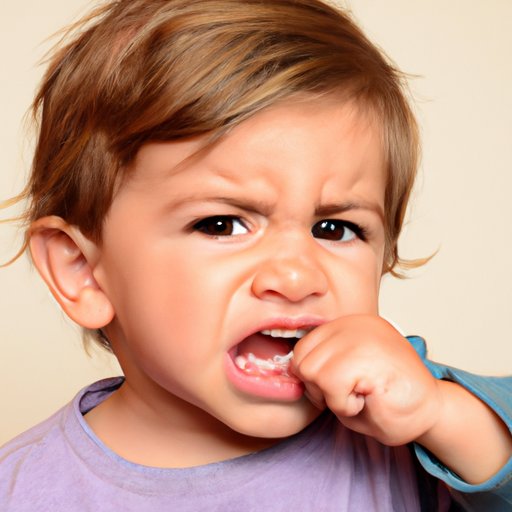Introduction
Toddler biting is a common behavior that many parents face. It can be frustrating, concerning, and even embarrassing for parents to deal with. While biting is a normal part of toddler development, it is important to understand why it happens and how to address it effectively. In this article, we will address the reasons behind toddler biting, offer practical tips for parents, debunk common myths and misconceptions, and provide strategies for managing and preventing aggressive behavior in toddlers.
The Science Behind Toddler Biting: Understanding the Root Causes
One of the key factors behind toddler biting is frustration. Toddlers often lack the language skills to express their emotions, which can cause them to feel overwhelmed and unable to communicate their needs effectively. In these situations, biting can be a means of venting their frustration or seeking attention from caregivers.
Another common cause of toddler biting is teething, which can be painful and unsettling for young children. Biting helps to relieve the pressure and discomfort they feel in their gums. Some toddlers may also resort to biting when they are feeling anxious, stressed, or overstimulated.
It is also important to consider the psychological and physiological factors that can contribute to toddler biting behavior. Some children may have sensory processing difficulties that affect their ability to tolerate certain types of touch or texture, leading them to resort to biting. Others may have experienced trauma or stress that makes them more prone to aggression and biting behavior.
Toddlers might express their frustration or emotions through biting in various ways. They may bite objects, such as toys or furniture, or they may bite people, including their parents, siblings, or other children at daycare or preschool.
How to Teach Your Toddler Not to Bite: A Practical Guide for Parents
If your toddler is biting, there are several practical strategies you can use to help them learn to express their emotions in more appropriate ways.
One of the most important things you can do is to be consistent in your discipline. Establish clear consequences for biting, such as a time-out or a loss of privileges, and explain to your child why their behavior is unacceptable. It is also important to provide positive reinforcement for good behavior, such as offering praise or a small treat when your child is playing nicely or using calm words to express their needs.
Another effective strategy for teaching your child not to bite is to model appropriate behavior. Show your child how to use language to express their emotions or frustration, and offer them alternatives to biting, such as clapping their hands or taking deep breaths when they feel overwhelmed.
Communication is key when it comes to addressing toddler biting behavior. Talk to your child about their feelings and why biting is not an appropriate way to express them. Encourage your child to use words to communicate their needs, and be patient as they learn to express themselves more effectively.
The Impact of Socialization on Toddler Biting Behavior
A toddler’s social environment can have a significant impact on their biting behavior. Children who are exposed to violence, aggression, or conflict in their home or community may be more likely to resort to biting as a means of expressing their emotions and dealing with stress.
Early childhood education and socialization can play a key role in preventing biting behavior. Children who are enrolled in daycare or preschool have the opportunity to interact with other children and learn social skills, including cooperation, sharing, and conflict resolution. Parents can also encourage positive socialization by arranging playdates, attending community events, or enrolling their child in extracurricular activities.
Parents should also teach their children how to respect other people’s personal space and boundaries. Encourage your child to ask for permission before touching someone else, and teach them to use alternative ways to express affection, such as giving hugs or high-fives.
Is Toddler Biting Normal? Debunking Common Myths and Misconceptions
There are a lot of misconceptions about toddler biting that need to be addressed. One of the most common myths is that biting is a sign of aggression or a lack of discipline. In reality, biting is a normal developmental phase for toddlers, and it is not a reflection of their character or personality.
It is important to understand that biting is a behavior that can be addressed through consistent discipline and communication. Parents should not feel ashamed or embarrassed if their child bites, but rather should focus on understanding the root causes of the behavior and working with their child to find alternative ways to express their emotions.
Toddler Biting: Strategies for Managing and Preventing Aggressive Behavior
There are several additional strategies that parents can use to manage and prevent aggressive behavior in their toddlers.
It is important to establish a routine and structure for your child’s day, including regular meals, naps, and playtime. This can help your child feel more secure and reduce stress and frustration that may lead to biting behavior.
If your child is prone to biting, it may be helpful to give them a warn and cool-off period. Tell them that if they feel angry or frustrated, they can take a short break to calm down before returning to play.
If your child is still biting despite your best efforts, it may be time to seek help from a pediatrician or child development specialist. They can help identify any underlying medical or psychological issues that may be contributing to the behavior, and offer additional strategies for managing and preventing biting behavior.
Conclusion
Toddler biting is a common behavior that can be frustrating and concerning for parents. However, it is important to remember that it is a normal part of development and can be addressed through consistent discipline and communication. By understanding the root causes of biting behavior, offering practical tips and strategies for parents, and encouraging positive socialization, parents can help their toddlers learn to express their emotions in more appropriate ways.
